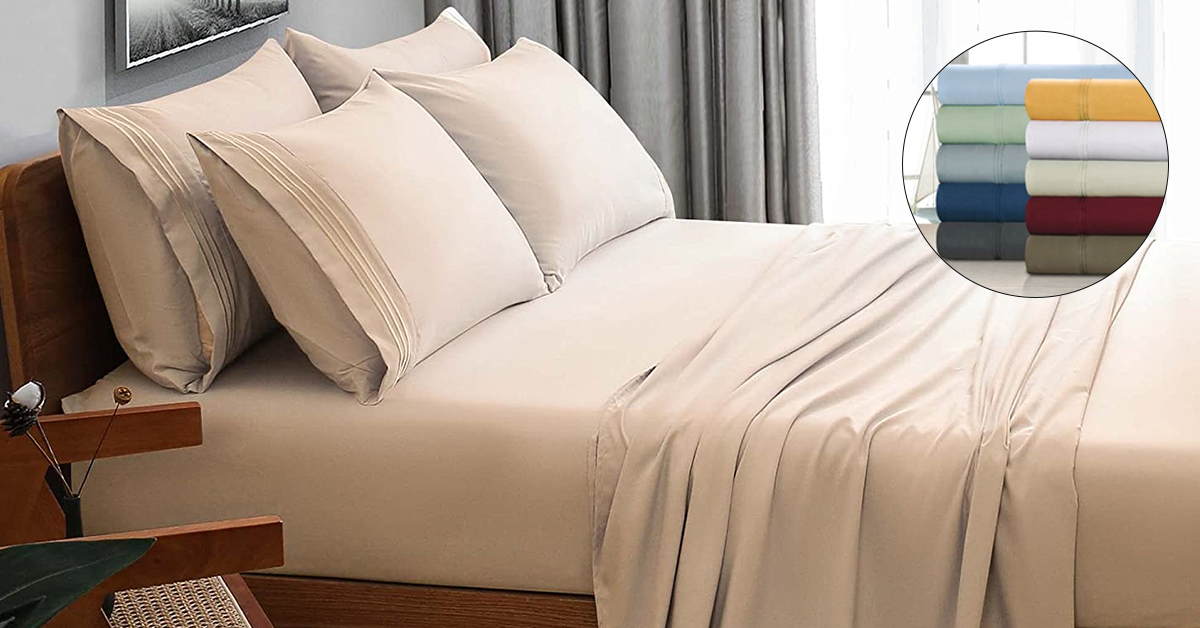It might be challenging to choose bedding that both fulfils your mattress requirements and satisfies your own tastes. One can easily spend weeks trying to find out which sheets to buy because there are so many different fabric materials to pick from.
The appeal of more pricey fabrics like silk or cotton is unquestionable. Microfiber bedding, on the other hand, can deliver similar softness, durability, and breathability along with many other uses at a far lower cost.
Microfiber bedding is a popular choice because of its numerous advantages. This article is all about microfiber bedsheets.
Before digging deep into the impressive benefits of microfiber bedding and how to choose the right one, let's get started from the very beginning to see whether it's the best option for your bedroom or not!
What Is Microfiber?
Microfiber is a man-made fibre, made by using synthetic polymers; polyester and polyamide. Both these materials play a significant role in giving the fabric a sheer look. Polyester is known as a type of plastic, on the other hand, polyamide is the rich name for typical nylon.
The finest microfiber strands are knotted by using thin yarns in the weave in a way that makes them porous and easily dryable. Polyester is known for its towels like structure and polyamide makes the fabric extra absorptive and of high density.
Microfiber is a versatile fabric that has the qualities of being long-lasting, soft, and absorbent all at the same time. As a result of its finest manufacturing, it is ideal to use in a wide range of industries, including bedding, household cleaning, clothing, furniture, and even sports equipment.
What Is Brushed Microfiber?

Brushed microfiber is recognized as the soft flannel texture. It has a silky, velvety feel that is achieved during the manufacturing process by rubbing metal brushes across its surface. To add extra softness to the fabric, it is usually brushed on both sides!
Brushed microfiber, is often known as micro flannel because it is significantly softer than cotton flannel. It is made up of millions of microscopic soft strands that have been scraped to the surface.
The disadvantage of brushed micro flannel bedding products is their lack of breathability. On the other side, its primary feature is its softness and warmth.
How Do Microfiber bedsheets Make?
Now, it is clear that microfiber is a blend of polyester, polyamide or some other type of material such as viscose. Also, it's also often blended with cotton.
The microfiber fabrics are made by combining polymers that are melted and spun into synthetic fibres, which are then woven or knit into fabric or textiles.
The fibres are so tiny, in fact, that one single fibre is 1/100 the thickness of a strand of human hair! In other words, it would take 100 microfiber fibres to equal the thickness of a single human hair strand.
The tiny fibres that make up microfiber cloth bedsheets make them very soft and comfortable fabrics to sleep in at night.
Is Microfiber Bedsheet Good?
The extraordinary softness and durability of the microfiber are due to the way they are fabricated and makes them a perfect choice for many people.
Pros of Using Microfiber Bedsheets
Microfiber is among the most enticing bedding fabrics due to its numerous advantages. Let's take a look at some of the most significant benefits of microfiber to see if it's the best bedding option for you!
Extremely smooth feel

The extremely smooth surface feels cool against your skin, making it an appealing option for hot summer nights when you don’t want to sleep too close to your body heat. Microfiber is made by spinning the weave into a fabric with very small holes. This means there are more fibres in the fabric and that makes it extremely smooth, finer and softer.
Hypoallergenic

In the case of microfiber bed sheets, they are not only tightly woven but also less breathable than cotton and linen fabrics. This allows the moisture to be absorbed while the heat escapes. Microfiber cloth bed sheets are also hypoallergenic which makes them ideal for people who suffer from allergies, asthma or other respiratory conditions.
Trouble-free washing
Microfiber sheets do not attract dirt or dust particles as easily as other types of fabrics do. As they don't attract these particles easily, they can be used longer before they need washing. Another advantage is that they do not require ironing and can be washed easily in domestic washing machines. In addition, they dry faster than other fabrics like cotton.
Inexpensive choice
Microfiber sheets are relatively inexpensive, hence they are a good choice for many people who want to transform their bedroom decor more frequently. The microfiber bed sheets are generally made from synthetic blends, which makes them cheaper than other bedding fabrics.
Warmth
Those who are sensitive to chills can certainly benefit from the heat-retention properties of microfiber. Microfiber is tightly woven and no space left in between the fibres, making it extra warm and comfortable in winter.
Cons of Using Microfiber Bedsheets
Where there are so many benefits of using microfiber bedding, there are disadvantages as well and you just can’t just simply ignore that.
Less breathable
This material's closely woven synthetic fibres trap air against your skin, leaving you to get overheated while you sleep.]
Poor quality
Microfiber comes in poor quality as well. You need to choose high-quality microfiber that will last for years to come. Low-quality microfiber feels like plastic against the skin and would not withstand frequent washes.
Allergic concerns
People having sensitive skin might face some irritating reactions due to the chemicals used in manufacturing. However, microfiber is a great option for people having dry skin because of its luxurious softness.
The Optimal Thread Count for Microfiber Bedsheets.
Thread count is the number of threads that make up one square inch of fabric (both vertical and horizontal). It's tempting to assume that a high thread count means a better night's sleep. However, the type of material and how it is woven are more important than how many threads are present.
When it comes to fabric softness and feel, thread count cannot be neglected. It's also commonly used in advertising to suggest that a certain fabric is of superior quality to comparable ones.
Thread count does play a role in determining a sheets' overall quality, but it's not the only factor that matters. Every fabric has the optimal thread count number and it is not a magic number that never changes.
The optimal thread count for microfiber bedsheets is between 200 and 400. This thread count will give you a soft, comfortable feel that is also durable. It's important to note that the threads in microfiber sheets are much thinner than those found in cotton sheets. That means that higher thread counts are not always better when it comes to microfiber materials.
Top Microfiber Bedding Products
One of the most popular uses for microfiber fabrics is bedding. Microfiber is used to make all kinds of sheets, comforters, blankets, and other bedding products. We have included our top five recommendations for microfiber bedding products below. We have also included a more comprehensive guide to choosing the right microfiber bedding at the bottom of this post.
Microfiber fitted sheets

The microfiber fitted sheets offer a smooth feel with stain resistance and wrinkle resistance properties. Deep fitted sheets with 25cm depth and extra deep fitted sheets with 40cm depth; give your bedroom a sleek and neat appearance. The fitted sheet pack contains one fitted sheet with elasticized corners and two pillowcases.
Microfiber reversible duvet covers
Duvets come alone and no one likes to use the duvet without its cover. Choose the best quality microfiber reversible duvet covers that wick away moisture to keep you cool in the summer and warm in the winter. A duvet cover set includes one duvet cover and two pillowcases.
Microfiber bedspreads
Using bedspreads is the easiest way to add a fancy and elite touch to your sleeping place. This bedding product features soft double-brushed microfiber that is fade-resistant as well as wrinkle-resistant. The microfiber bedspreads will stay looking good for years o come and you don't have to waste time ironing them.
Microfiber mattress protectors
Mattress hygiene is really important. Microfiber mattress protector covers provide the ultimate protection to your heavy-duty mattress from spills, specks of dust and allergens. The mattress protectors with high-quality straps hold it in place and let you enjoy peaceful night sleep.
How to Choose the Best Microfiber Bedsheets?

Before buying the microfiber bed sheets for you, consider the following factors into consideration to get quality products that won’t make you regret them at all.
Feel of the fabric
Although microfiber possesses a soft and smooth touch, most people don't prefer this fabric due to its slippery surface. For them, there are sheets available made from brushed microfiber as it is less slippery.
Thread count
Microfiber is only breathable to some degree. Make sure you choose a microfiber sheet having a thread count of 90 to 120, especially if you are seeking breathable microfiber. It keeps you cool and fresh.
Mattress size

Before making a purchase for microfiber sheets, make sure you have accurate mattress measurements. Microfiber sheets can be found in broader size ranges easily so choose one that fits your mattress perfectly.
Treat Your Bedroom Right with High-Quality Microfiber Bedsheets

Whether you choose a bedding set or mattress protector for your bedroom, microfiber fabric is the best choice to go for. It has a lot of benefits with a few downsides that won't be a big deal if you opt for quality microfiber bedding.
Imperial Rooms offers the highest quality microfiber bedsheets to give off your bedroom a five-star hotel like appearance without hurting your budget. Microfiber bed sheets are best for creating a vibe that is conducive to getting peaceful night sleep while keeping you fresh and relaxed. We offer exquisite designs in microfiber bedsheets to cultivate the perfect lively ambience for resting.


